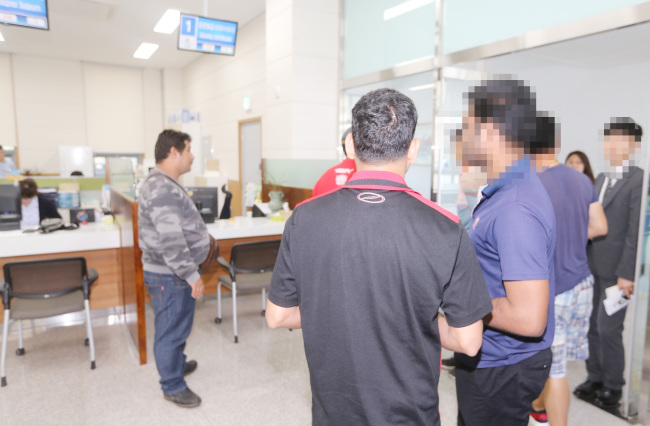[Newsmaker] South Korea’s ‘refugee crisis’ reveals its gendered Islamophobia
By Claire LeePublished : June 27, 2018 - 18:03
With some 500 Yemeni nationals seeking asylum on Jeju Island, many in South Korea say the country is facing its first “refugee crisis.”
Indeed, the influx of the refugees from Yemen has triggered a fierce backlash among Koreans against immigration rules of Jeju Island, where, unlike the rest of South Korea, most foreign passport-holders can stay for a month without a visa.
Many of those who oppose the visa-waiver program say Yemenis will only “create problems” in Korea, especially against local women because “they are Muslims.”
Indeed, the influx of the refugees from Yemen has triggered a fierce backlash among Koreans against immigration rules of Jeju Island, where, unlike the rest of South Korea, most foreign passport-holders can stay for a month without a visa.
Many of those who oppose the visa-waiver program say Yemenis will only “create problems” in Korea, especially against local women because “they are Muslims.”

As of Tuesday afternoon, more than 430,000 Koreans have signed an online petition asking the presidential office to deport Yemeni asylum seekers and revise current immigration laws to scrap Jeju’s current visa waiver program.
A protest march is set for Saturday to press the government to proceed with the deportation of the existing refugees in the country, even though the presidential office announced earlier this month that all Yemenis will now have to obtain a visa to enter South Korea, including Jeju Island.
Concerns are rising as many online comments on the issue, including many on the Cheong Wa Dae website, are blatantly racist and Islamophobic. And yet the authorities have not done much to prevent or moderate such remarks online.
“Please deport all Yemenis,” a comment on the Cheong Wa Dae website reads.
“What is this country going to become once affected by Islam? It will no longer to be a safe country. Please, I beg you, Mr. President.”
Of all Yemeni asylum seekers on Jeju Island, 91 percent are male. Many of the Islamophobic comments by Koreans contain ill-informed prejudices against Muslim culture, especially its treatment of women. Such sentiment and prejudice is shared by both Korean men and women.
“I’m a full-time mother and I have a young daughter,” wrote a woman on the website of the presidential office.
“I have learned that women’s rights do not exist in Yemen and its culture allows sexual violence against women. And those who commit the crime feel that there’s nothing wrong with it. For the future of our children, I believe no refugee should be allowed to stay in our country.”
A Korean man, who also filed a petition online asking the presidential office to deport the Yemeni refugees, claimed that Muslim men only see women as the “subject of rape and murder.” He claimed that by allowing male refugees from Yemen, many of whom are single, to stay on Jeju, the Korean government is “putting Korea’s young women in danger.”
“These men are young and have run away from their home countries because their own survival was their first and foremost priority,” he wrote. His comments have now been deleted by the Cheong Wa Dae authorities.
According to the UNHCR, Yemen is in the grip of one of the worst humanitarian catastrophes in the world. Two million have been forced to flee their homes because of increased violence in the country. More than 8 million in Yemen are at risk of starvation and disease.
Experts say that most South Koreans do not get much exposure to human rights education and the issue of cultural and religious diversity while in school.
“Ignorance is what causes fear,” said Shin Kwang-young, a sociology professor at Chung-Ang University in Seoul.
“Most Koreans have never met real-life refugees while living in the country and have not had much exposure to the modern history of certain regions in the world, including the Middle East.”
Noh Hye-kyung, a feminist poet, said it breaks her heart to see some Korean women being a part of racist discourse against Yemeni refugees.
The women have publicly opposed Yemeni refugees staying in Korea, framing Yemeni male refugees as potential criminals.
Such women mentioned the 2015-2016 New Year’s Eve gang assaults on women in Germany, as an event that could potentially take place in Korea as well should the government let Yemeni refugees stay in the country.
At the time, German authorities stated that almost all of the suspects of the crimes were non-Germans.
“I am much more afraid of some 850,000 Korean men who have been members of illegal porn sharing online sites than I am afraid of some 500 Yemeni male refugees,” poet Noh wrote in her column for a local news outlet.
“Why is our fear as women being expressed against men who may be the most vulnerable?”
By Claire Lee (dyc@heraldcorp.com)


















![[Today’s K-pop] Treasure to publish magazine for debut anniversary](http://res.heraldm.com/phpwas/restmb_idxmake.php?idx=642&simg=/content/image/2024/07/26/20240726050551_0.jpg&u=)